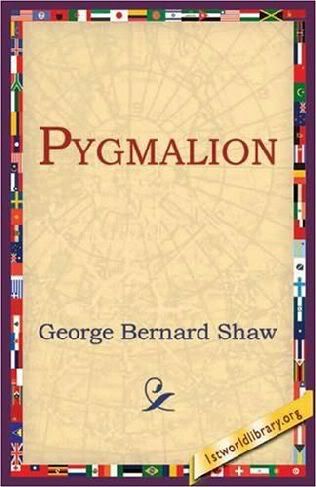For this task you need to read a book off the Barnes and Noble classic list. Classics

Pygmalion by George Bernard Shaw
first published 1914
Notes: I received this ebook free from Barnes and Noble classic summer downloads
Rating: 4/5
Just a warning before we begin. I go a little into detail about the relationship between Eliza and Henry which includes commentary about what happens after. If you have not seen the play and want to be surprised, be warned.
When I was in high school, I tried out for Pygmalion. I didn't get any part and in my anguish did not go see the show. I had heard that My Fair Lady was based on this play, but I've never seen that. I've read the myth about Pygmalion, but honestly didn't make the connection until I was reading the footnotes. So suffice it to say all I knew about Pygmalion's Eliza and Henry I learned from Family Guy.
So with practically a clean slate I dove in and I must say I rather enjoyed myself. I've always liked the quotes I've seen by Shaw floating around the internet, but never made the connection to the playwright.
It was interesting, surprisingly funny and quite entertaining. I could see in my head some of the cues onstage and how well they would work. I enjoyed Eliza and Henry's interactions the most, and was honestly quite confused by the ending. I clicked next page and there was no more play, but a nice essay by Shaw about what happened after. Toward the end there is quite a conversation between Higgins and Eliza which to me it dripped with sexual tension, but that was just my romance novel reader brain apparently. Because that is not how it ended. It was really interesting reading Shaw talking about why he chose to end the play the way he did going against what the mainstream public would want. Apparently, he added this afterword because everyone kept asking, but why can't they be together?
There have been times, wikipedia told me, that certain directors have changed the ending to suit the happiness of the audience, but I understand where Shaw is coming from. The play he wrote is a jab and society. Its a comedic satire, not a love story. There is no need for a happily ever after, because this is supposed to be real life. It's interesting also because the myth of Pygmalion has the sculptor living happily ever after with his creation, so he even deviated from the source material.
I don't know how I feel about changing the ending to suit the coffers. Part of me says "If you don't like it, write your own play!" but the other part of me says "Gotta do what's best for business." I am not really curious to see how My Fair Lady ends but I would tend to be more lenient about this seeing as it is an adaptation of the play.
So in conclusion, this really is a great play. I really enjoyed it and would love to see it onstage at some point.
Ah, I just read Pygmalion about a month ago. I had no idea what it was about - but I enjoyed it so much. It was one of the funniest plays I think I've read, since Oscar Wilde's The Importance of Being Ernest.
ReplyDeleteI've read The Picture of Dorian Gray but nothing else by Wilde. I enjoyed his writing, so I must add The Importance of Being Ernest to my TBR. I think I would really enjoy a comedy by Wilde! Thanks for the tip!
ReplyDeleteGlad you liked Pygmalion. I honestly was afraid it wasn't going to be that good, but I am so glad I was wrong. I want to pick up more of Shaw's works now!